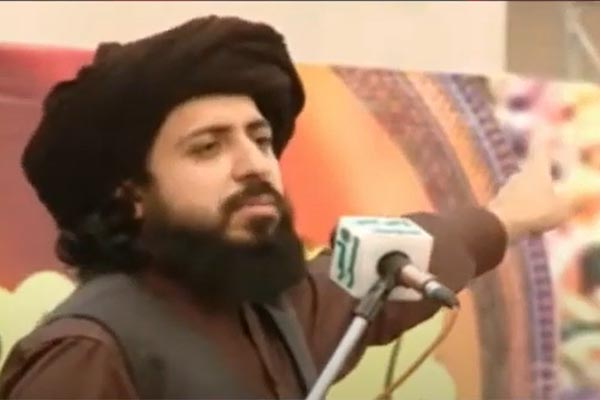
Detained TLP chief Saad Rizvi. Image courtesy YouTube
Banning the extremist party is not enough; the time has come to act on the 2019 recommendations of Justice Qazi Faez Isa
On April 13, the Tehreek-e-Labbaik Pakistan (TLP) rioted in all the major cities of Pakistan, smashing private vehicles, thrashing policemen and blocking traffic in protest against the arrest of their leader Saad Hussain Rizvi from Lahore. They were also protesting a breach of “pledge” of the incumbent Pakistan Tehreek-e-Insaf-led government to expel the French ambassador in Pakistan over the publication of blasphemous caricatures in France.
The government kept mum about the unprecedented siege of Pakistan by a not-so-popular party, and the TV channels simply showed the mayhem on the roads without naming the culprit. After three days, the government of Imran Khan finally decided to move toward declaring the TLP a terrorist organization. Why was the government scared of announcing who was attacking and killing policemen and destroying property across Pakistan? Most observers attributed this silence to an earlier event: a 2019 Supreme Court verdict against TLP’s Faizabad “dharna,” which “ordered action against Army officers who engaged in political activity during the 2017 TLP sit-in, media houses who aired material inciting hatred and violence” and said the military cannot censor the press.
In the aftermath, President Arif Alvi—instead of taking action against the TLP—indicted Justice Qazi Faez Isa for writing the verdict, with many in Pakistan expecting the senior judge to be fired from his seat in the Supreme Court because of the “findings” in his ruling. The verdict said: “The ambitious leadership of a fledgling political party [TLP] projected itself as the defender of the Muslim faith. They provoked religious sentiment, stoked the flames of hatred, abused, resorted to violence and destroyed property worth Rs. 163 million.” In 2021, the damages are yet to be counted as they occurred across many cities.
The court under Justice Isa expressed its disappointment with the way the PMLN government of the time handled the case, especially when the public perception was that the ISI, the country’s topmost spy agency, had been involved in it. Referring to intelligence agencies, the court explained that “intelligence agencies here refers to the ISI, Intelligence Bureau and Military Intelligence.” When the court asked the ISI whether the TLP paid income tax or had bank accounts, the ISI said it “did not have the mandate to gather such information.” However, “this information was provided to the court in a sealed envelope with the request that it not be disclosed.”
The court went back to another case of the Army’s interference in politics and referred to the Air Marshal Asghar Khan case, that “involved the officers/members of secret agencies, ISI, MI, IB etc in unlawful activities, individually or collectively, which called for strict action.” The court went on: “Pursuant to the judgment in Air Marshal Asghar Khan’s case, the involvement of ISI and of the members of the armed forces in politics, media and other ‘unlawful activities’ should have stopped. Instead when TLP’s dharna participants received cash handouts from men in uniform the perception of their involvement gained traction.” It also noted that the director-general of the Inter-Services Public Relations (ISPR)—at the time Lt. Gen. Asif Ghafoor—had also taken to commenting on political matters.
The Court ruled that all intelligence agencies and the ISPR must not exceed their respective mandates. “They cannot curtail the freedom of speech and expression and do not have the authority to interfere with broadcasts and publications, in the management of broadcasters/publishers and in the distribution of newspaper.” Referring to the ISI’s statement that it could not provide information on the activities of the TLP, the court said: “Intelligence agencies should monitor activities of all those who threaten the territorial integrity of the country and all those who undermine the security of the people and the state by resorting to or inciting violence.”
The Court finally ruled: “The Constitution emphatically prohibits members of the armed forces from engaging in any kind of political activity, which includes supporting a political party, faction or individual. The Government of Pakistan through the Ministry of Defense and the respective chiefs of the Army, the Navy and the Air Force are directed to initiate action against the personnel under their command who are found to have violated their oath.”
Reporting on the 2017 TLP dharna, daily Dawn wrote on Feb. 8, 2019: “Anyone having a grouse against the government joined in. The report submitted by Inter-Services Intelligence under the title Public Support and subtitle Political Parties/Personalities listed the following: 1) Sheikh Rasheed Ahmed (Chairman AML), 2) Ejaz-ul-Haq (PML-Z), 3) PTI Ulema Wing Islamabad released audio message, 4) Sheikh Hameed (PPP).” Today Interior Minister Sheikh Rasheed says he never met the founder of TLP, and did not support the party, but was always anti-blasphemy. The free publicity provided by him and the other politicians named by the Supreme Court helped make the TLP, a little known political party, into a phenomenon. Enjoying the limelight, TLP’s leadership became ever more intransigent, abusive and aggressive. The subsequent appeasement by the PTI-led government whenever the TLP resorted to street power furthered its belief of ‘untouchability.’
The ban announced by Rasheed is a good first step. But if Pakistan wants to avoid a repeat in future, it must introspect and act in accordance with the judgment of Justice Qazi Faez Isa. The alternate is waiting for the next TLP to emerge and continuing the policy of appeasement that leaves Pakistan at the mercy of rioters every time they manufacture a “threat.”
